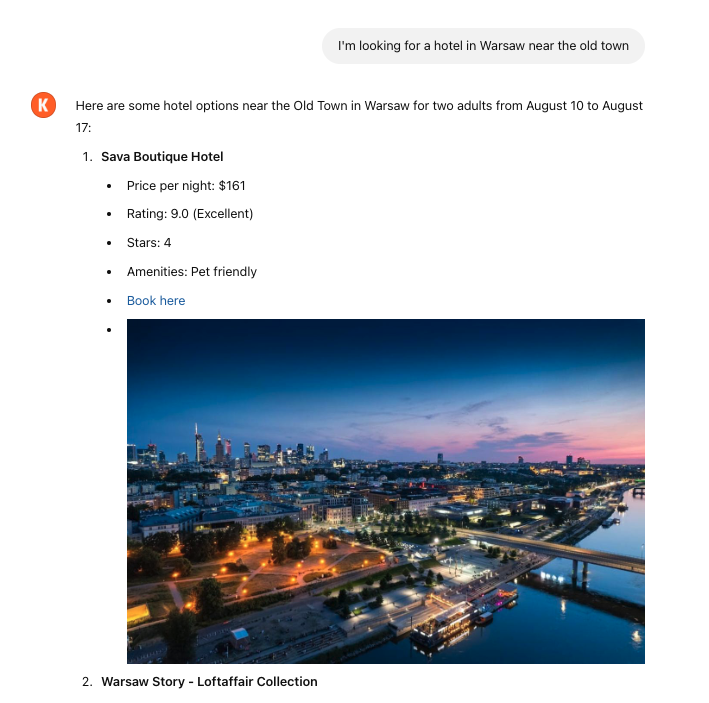Generative AI is the talk of the town these days. Since ChatGPT and image generation tools like MidJourney hit the scene, the world has gone crazy for artificial intelligence, particularly the branch focused on “generating” various content – from text and images to music and even videos. Today, distinguishing between AI-created work and human-made creations is often challenging, and the future promises to be even more intriguing.
But have you ever wondered how generative AI can—or rather, already is—impact the tourism industry? In this article, we’ll explore eight real-world examples of how leading companies in this sector are leveraging this technology. Read on to discover how this innovative tech could potentially boost your business, too!
Generative AI in Tourism – Application Examples
1. Trip Planning
One of the most popular applications of Generative AI in tourism is trip planning tools that offer tourists personalized recommendations of interesting places. A prime example is the AI Trip Planner introduced by Booking.com. This innovative solution uses ChatGPT technology to process user queries expressed in natural language. The system generates personalized accommodation recommendations and creates tailored travel itineraries based on travelers’ preferences. Moreover, the AI Trip Planner is fully integrated with Booking.com’s reservation system, allowing for a seamless transition from the planning stage to making bookings.
Tripadvisor has implemented a similar solution, combining the platform’s vast database with Generative AI technology. This tool analyzes over a billion Tripadvisor user reviews and opinions to create detailed, day-by-day travel plans. The system considers the user’s information, such as travel destination, dates, companionship, and preferred activities. Currently, the generator provides recommendations for attractions, experiences, and dining options, with plans to expand to hotel suggestions shortly. Users can save, edit, and share the generated travel plans, making the planning process more flexible and tailored to individual needs.
2. Hotel Review Summaries
Another fascinating application of Generative AI in tourism is tools that create concise summaries of hotel reviews, offering travelers quick insights into key features of accommodations. Again, we’ll use Tripadvisor as an example. The company has introduced a feature that uses generative artificial intelligence to analyze numerous user reviews and generate short, easy-to-digest summaries. The AI system extracts popular topics and details frequently mentioned in guest opinions, creating a quick overview of each hotel. These summaries contain the most important information about the properties, allowing potential customers to make decisions faster and plan their trips more efficiently.
3. GPT Plugins
As you can see, many companies use GPT technology in their applications, but you can also try it the other way around. A trend that has been gaining popularity for some time is the creation of dedicated plugins for OpenAI’s ChatGPT platform. They enable the integration of ChatGPT with tourism companies’ databases, allowing for more natural and contextual responses to user queries. For example, a traveler can ask: “I’m looking for a hotel in Warsaw near the old town” using the Kayak plugin, and the plugin will pass the user’s preferences to Kayak’s travel offer search engine, providing up-to-date data on hotels, flights, or tourist attractions tailored to the user’s needs and preferences.

Similarly, the Expedia plugin allows ChatGPT users to obtain detailed information about flights, accommodations, and attractions, with the option to directly proceed to booking on the Expedia website. This integration simplifies the travel planning process and opens up new possibilities for personalization and contextual delivery of travel information. There’s no denying that it’s also an excellent way to acquire customers through one of the most popular tools in the world.
4. AI Travel Assistants
An innovative application of generative AI in tourism is advanced travel assistants, offering comprehensive help at every stage of planning and executing a trip. One example is TripGen, a chatbot introduced by Trip.com. It aims to provide travelers with comprehensive service before, during, and after their journey, significantly simplifying the process of planning and realizing a trip. The tool can answer complex or unclear questions, deliver personalized travel plans, and offer advice on flights, hotels, transportation, and excursions.
These innovations perfectly demonstrate how generative AI can transform into a virtual, versatile travel companion, available on-demand in a mobile application. Such solutions can make users more engaged in interactions with your brand, becoming more loyal customers.
5. Optimization of Marketing Content
One of the most popular applications of tools like ChatGPT is text generation – including, of course, marketing content. And in tourism, where first impressions often determine success, creating effective texts and descriptions is extremely important.
Magpie knows this well. They developed a tool for tour operators to help them create better offers. This solution acts like a virtual copywriter specializing in tourism. In the blink of an eye, it can transform a simple, sometimes even unrefined, tour description into an attention-grabbing, professional marketing text. Interestingly, the tool allows for adjusting the tone of voice – it can be persuasive, humorous, or full of emotion, depending on the needs.
The creators also didn’t forget about personalization. Therefore, when using their tool, you can specify your target audience and the tool will tailor the content to them. Moreover, the tool offers instant translations into 10 major languages, opening doors to international markets.
This application of generative AI demonstrates how it can support small- and medium-sized tourism businesses in creating professional marketing content, potentially increasing their competitiveness and improving the visibility of online offers.
6. Voice Assistants in Local Languages
Generative artificial intelligence is also finding applications in facilitating access to tourism services through voice assistants. An excellent example is the collaboration between Indian booking service MakeMyTrip and Microsoft, which aims to introduce a voice assistant for reservations in Indian languages.
This solution allows users to make bookings using voice commands in their native languages. The system utilizes Microsoft Azure OpenAI Service and Azure Cognitive Services for natural speech processing and response generation.
The assistant’s functionalities include:
- Personalized travel recommendations
- Creating vacation packages tailored to occasions, budgets, activity preferences, and travel time
- Summarizing hotel reviews considering the traveler’s profile (e.g., solo or family)
- Supporting various modes of transportation
Currently, the system supports English and Hindi for flight and vacation package bookings, and plans are underway to expand this solution to other languages and services.
This application of generative AI demonstrates how it can break down language barriers and increase the accessibility of tourism services in culturally diverse regions, making the travel planning process more user-friendly.
7. Comparing Travel Offers
Generative artificial intelligence finds an innovative application in automating the process of comparing travel offers – including through image analysis. This technology allows users to easily compare prices and conditions of various offers without the need for manual data entry.
An example of such a solution is Kayak’s PriceCheck tool. This innovative tool allows users to upload a screenshot of a flight itinerary from any website. The AI system analyzes the image, extracting key information such as date, route, and travel class. Then, using this data, it searches hundreds of pages to find the best deal for the given route.
8. Support in Customer Communication
In today’s world, where information is at our fingertips, the tourism industry faces the challenge of providing customers with fast, accurate, and personalized information. Here, generative artificial intelligence comes to the rescue, revolutionizing how companies communicate with travelers.
Take for example a situation we all know – a flight delay. Instead of a standard, laconic message, imagine a message that really explains what’s going on. United Airlines has introduced such a solution as part of their “Every Flight Has a Story” program.
As its creators say, it combines the power of Generative AI with human empathy. Artificial intelligence analyzes a wealth of data – from weather conditions to airport traffic – and creates an initial message. Then, a team of “storytellers” reviews and refines this information, adding a human element to the communication.
The result? Passengers waiting for their flight no longer receive dry information about a delay. Instead, they might receive a message explaining the delay due to runway renovation work at a given location. It’s a small detail, but it significantly impacts understanding the situation and makes it a bit more bearable.
Our search engine, Qtravel.ai, also provides similar personalization options. Our solution provides an API that can be used not only to display data on the website but also to automatically handle email inquiries. When a customer sends an email inquiring about a specific holiday, the Qtravel.ai system can automatically generate a response containing personalized offers with relevant links, significantly speeding up the process of finding the perfect holiday.
Conclusion
Generative artificial intelligence is changing the face of the tourism industry, streamlining travel planning, bookings, and customer communication. From content personalization to advanced price comparison tools – it opens up new possibilities for businesses and travelers, creating more personalized and satisfying experiences.
If you want to stay up-to-date with the latest AI implementations in tourism, sign up for our newsletter! Every month, we deliver the most interesting information straight to your inbox. Sign up today and stay one step ahead of the competition!
